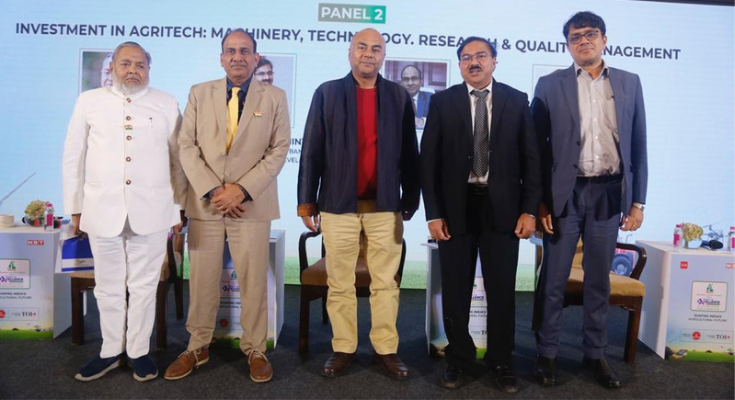Shrinking landholdings and worsening soil degradation necessitate technology in agriculture to feed future generations. Participating in ‘Right to Excellence Agritech Summit 2023’ in New Delhi days ahead of Farmers’ Day, experts emphasized on the need for economically viable and ecologically sustainable technology to ensure widespread adoption.
Underscoring the critical role of technology in feeding future generations, Dr. R. C. Agrawal, Deputy Director General of Indian Council of Agricultural Research (ICAR), announced at the gathering that Artificial Intelligence (AI) studies will be mandatory for agricultural students.
“In India’s journey to nourish future generations, technology will be a key. Using artificial intelligence in tackling crucial agricultural challenges like disease identification and pesticide application is the need of the hour. Realizing its importance, we have made studying AI mandatory for agriculture students,” Dr. R. C. Agrawal said.
The farm tech frenzy is here to stay, driving an anticipated rush of investment. But Mr. Govinda Rajula Chintala, ex-NABARD chief, cautioned that the windfall depends on agri-tech delivering profits for farmers, not just investors, while respecting India’s huge environmental diversity.
Debunking the cancer-pesticide myth, Dr. RG Agarwal, Chairman of Dhanuka Group, highlighted India’s significantly lower pesticide consumption compared to China (350 grams per hectare in India as against 1,300 grams in China per hectare)
“Various studies have found no link between agricultural pesticide use and cancer,” Dr. Agarwal said while outlining five points of agenda to change the face of Indian agriculture – promotion of green manure to improve health of soil, widespread adoption of technology among farmers, construction of ponds etc for restoring the water table and water management, seed treatment and government’s systematic withdrawal from role of trader in agriculture space.
Challenging widespread beliefs on pesticide- cancer link, Dr. Rakesh Sharda, Principal Scientist (Plasticulture) at Punjab Agriculture University, revealed that contrary to perception, pesticide use in Punjab is on the decline. In a session on “Sustainable Agriculture Technologies,” he argued that water pollution and heavy metals, not pesticides, are the hidden culprits behind both soil degradation as well as cancer.
Batting for research and judicious use of agro-chemicals in agriculture, Dr. P. K. Singh, Agriculture Commissioner, Ministry of Agriculture & Farmers Welfare, Government of India said, “Government is promoting Integrated Pest Management approach against plant diseases and in fact, agro-chemicals are helping in getting rid of ‘Vikriti’ in agriculture.” He also emphasized that an investment of merely Rs. 1 in agricultural research yields at least Rs. 14 in return.
In a session on agritech regulations, the session witnessed difference of opinions. Dr. Shobhna Kumar Pattanayak, former Secretary and Dr. S. C. Dubey, ADG (Plant Protection and Biodiversity), ICAR of Ministry of Agriculture, Government of India defended India’s forward-looking and farmer-friendly regulations, promoting innovation within a responsible framework. Meanwhile, Mr. Vijay Sardana, a techno-legal expert for Dairy, Food, Agribusiness & allied sectors advocated for their complete abolition, arguing that they stifle agricultural innovation.
Dhanuka Group Chairman Dr. Agarwal, while presenting vote of thanks, made an impassioned plea saying that the system should support Hon’ble Prime Minister’s vision for country by making agriculture industry related laws growth-oriented that support the entrepreneurs and technology.







